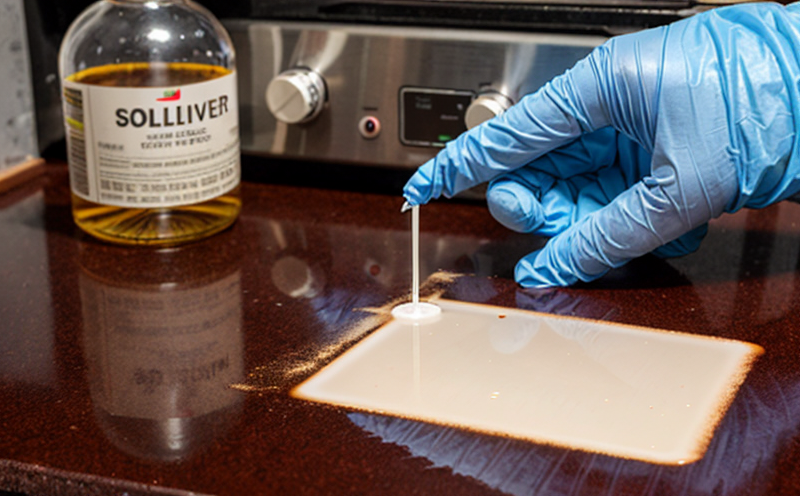EPA 8015 Solvent Residue Testing in Nonhalogenated Organics
The EPA method 8015 is a stringent protocol designed to measure solvent residues in nonhalogenated organic materials. This testing ensures that products meet regulatory standards and are safe for end-use applications.
Nonhalogenated organics include a wide range of compounds used across various industries such as pharmaceuticals, electronics, and personal care products. These materials may contain volatile solvents that can affect product purity and safety if not properly managed. EPA 8015 provides a standardized approach to quantify these residues, ensuring compliance with environmental regulations.
The testing process involves several critical steps: sample preparation, solvent extraction, derivatization (if necessary), injection into an analytical instrument, and data analysis. The method uses gas chromatography or liquid chromatography coupled with mass spectrometry for accurate detection. The acceptable limits for solvent residues are set by the Environmental Protection Agency based on potential health impacts.
To ensure reliable results, strict quality control measures are implemented. This includes using certified reference materials (CRMs) to calibrate instruments and validate methods. Regular method validation is also performed to confirm that the test remains accurate over time. In addition, personnel involved in EPA 8015 testing undergo extensive training to maintain proficiency.
Understanding the intricacies of this method helps stakeholders appreciate its importance. Compliance officers need to ensure their processes comply with regulatory requirements while quality managers focus on maintaining product integrity and safety. R&D engineers benefit from knowing the parameters that influence test outcomes, allowing them to refine formulations accordingly. For procurement teams, understanding these standards ensures they source materials compliant with environmental regulations.
Given the complexity of EPA 8015 testing, it's essential for laboratories specializing in this area to have experienced staff and state-of-the-art equipment. Eurolab, as a leading provider, offers comprehensive support, including detailed protocols, training sessions, and consultation services tailored to individual needs.
Benefits
- Ensures compliance with EPA regulations
- Enhances product safety by eliminating harmful residues
- Supports quality control in manufacturing processes
- Aids in regulatory approval and certification
- Promotes environmental stewardship through reduced pollution risks
- Facilitates safer end-use applications for consumers
- Improves overall product performance by ensuring purity levels
Industry Applications
| Industry Sector | Main Uses of EPA 8015 Solvent Residue Testing |
|---|---|
| Pharmaceuticals | Detecting solvent residues in medications to ensure patient safety. |
| Electronics | Identifying contaminants that could affect product reliability and performance. |
| Personal Care Products | Avoiding the inclusion of harmful solvents which can be absorbed by skin. |
| Petrochemicals | Maintaining compliance with environmental standards for waste management. |
Eurolab Advantages
Eurolab stands out in offering EPA 8015 solvent residue testing due to our commitment to accuracy and efficiency. Our experienced team leverages advanced technology and methodologies to deliver precise results consistently.
We provide comprehensive support through detailed protocols, ensuring that clients understand every aspect of the testing process. With regular method validation, we maintain the highest level of reliability in our tests. In addition, our training sessions help personnel stay up-to-date with industry best practices, enhancing their skills and knowledge.
Our state-of-the-art facilities are equipped to handle a wide range of samples, from small volumes to bulk materials. This flexibility allows us to cater to diverse client needs efficiently. Eurolab also offers consultation services, providing guidance on how to integrate EPA 8015 testing into existing quality management systems.
Choosing Eurolab for your EPA 8015 solvent residue testing ensures peace of mind knowing that you're working with experts who adhere strictly to international standards such as ISO and ASTM. Our reputation for excellence in laboratory services has earned us a trusted position among industry leaders worldwide.





